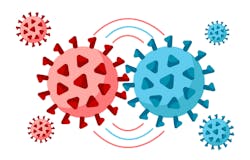Naturally occurring mutations of SARS-CoV-2 main protease confer drug resistance to nirmatrelvir
The SARS-CoV-2 main protease (Mpro) is a cysteine protease, a validated antiviral drug target. Paxlovid, an FDA-approved oral COVID-19 antiviral contains the Mpro inhibitor nirmatrelvir and the metabolic booster ritonavir; however, the emergence of SARS-CoV-2 variants mutations in the Mpro raised the alarm of potential drug resistance. This study aims to discover Mpro drug resistant mutants from naturally observed polymorphisms, according to a news release.
Through analyzing the SARS-CoV-2 sequences deposited in Global Initiative on Sharing Avian Influenza Data (GISAID) database, researchers identified 66 prevalent Mpro mutations located at the nirmatrelvir binding site. The Mpro mutant proteins were expressed and characterized for enzymatic activity and nirmatrelvir inhibition. While the majority of the Mpro mutants had reduced enzymatic activity (kcat/Km >10-fold decrease), 11 mutants including S144M/F/A/G/Y, M165T, E166Q, H172Q/F, and Q192T/S/V showed comparable enzymatic activity as the wild-type (kcat/Km <10-fold change) and resistance to nirmatrelvir (Ki > 10-fold increase).
Researchers further demonstrated that the enzymatic activity and inhibitor resistance of these single mutations can be enhanced by additional substitutions in a double mutant. X-ray crystal structures were determined for six of the single mutants with and/or without GC-376/nirmatrelvir. The structures illustrate how mutations can reduce ligand binding by impacting the conformational stability of the active site. Overall, our study identified several drug resistant hot spots that warrant close monitoring for possible clinical evidence of Paxlovid resistance.

